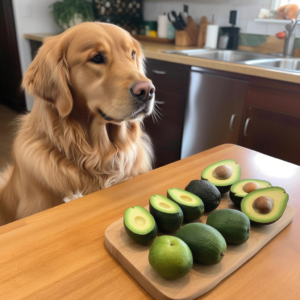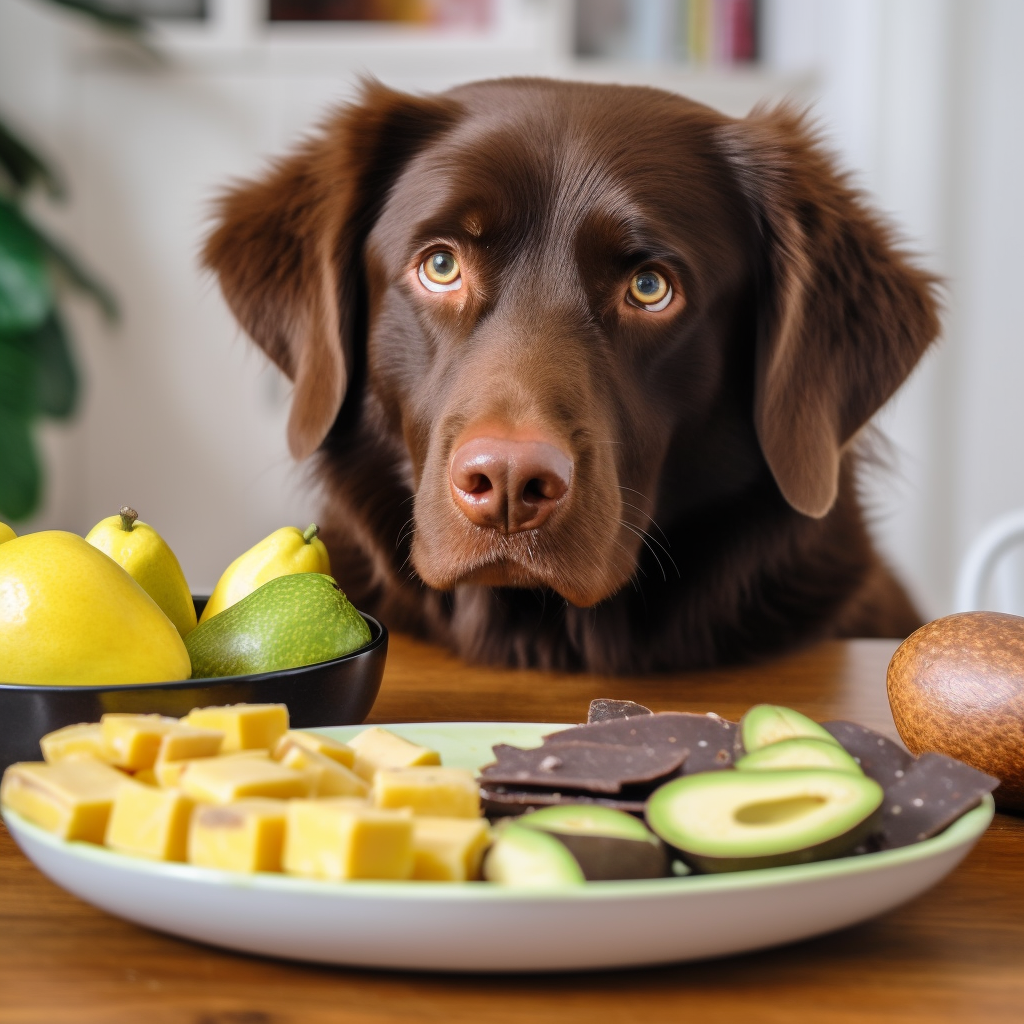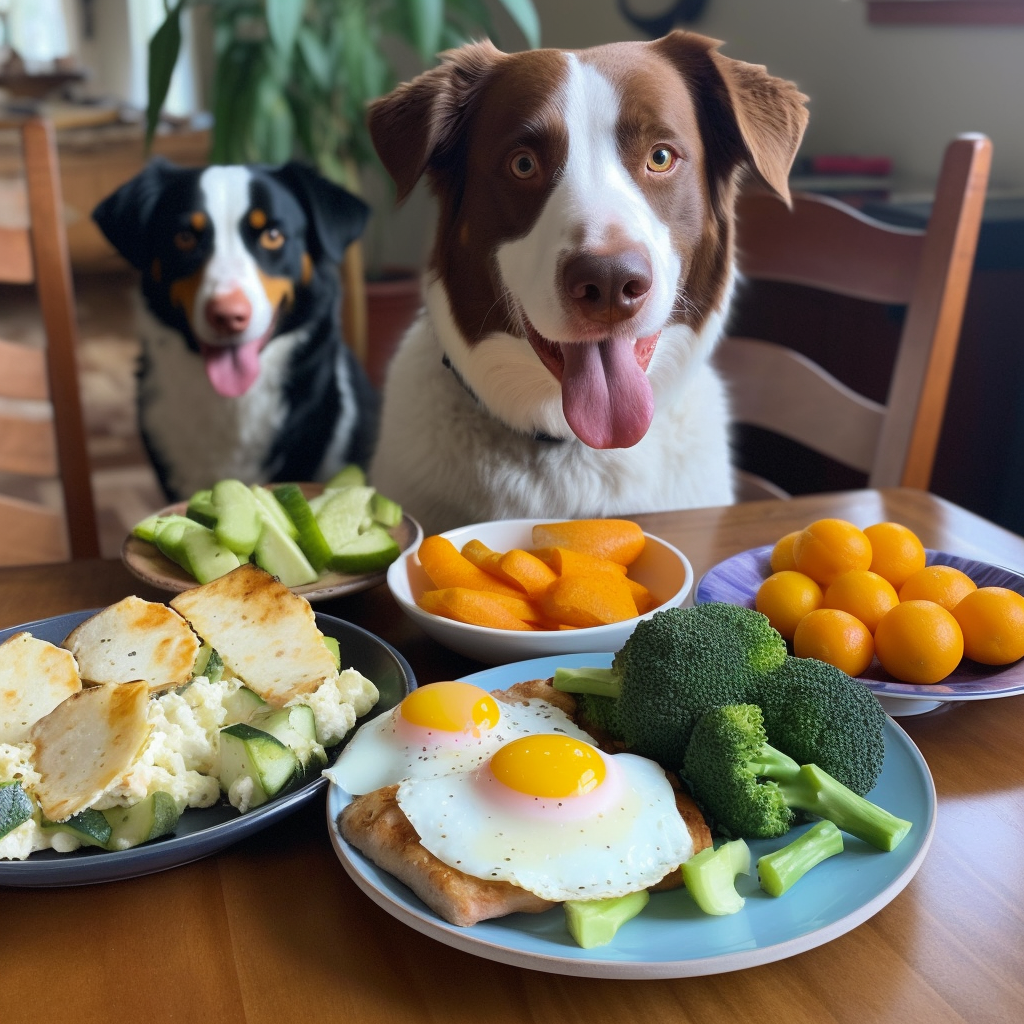Protecting Your Furry Friend’s Health
As loving dog owners, it’s essential to be aware of the foods that can be toxic or poisonous to our four-legged companions. While certain human foods are safe for dogs in moderation, others can pose serious health risks. In this blog post, we’ll explore common foods that are poisonous to dogs, the reasons behind their toxicity, and what immediate steps to take if your dog accidentally ingests them.

Chocolate:
Chocolate contains theobromine, a stimulant that affects dogs differently than humans. Even small amounts can lead to symptoms like vomiting, diarrhea, increased heart rate, tremors, and, in severe cases, seizures. Dark chocolate and cocoa powder are particularly dangerous due to their higher theobromine content.
Grapes and raisins:
Grapes and raisins, although healthy for humans, can cause kidney failure in dogs. The exact toxic compound is unknown, but ingestion can lead to vomiting, lethargy, loss of appetite, and increased thirst. Prompt veterinary attention is crucial if your dog consumes grapes or raisins.
Onions and garlic:
Onions and garlic contain compounds that can damage a dog’s red blood cells, leading to a condition called hemolytic anemia. Symptoms may include weakness, pale gums, elevated heart rate, and collapse. Keep all forms of onions and garlic, including powders and cooked products, away from your furry friend.
Xylitol:
Xylitol is a sugar substitute found in many sugar-free and low-sugar products like chewing gum, candies, and baked goods. Ingesting xylitol can cause a rapid release of insulin in dogs, leading to hypoglycemia (low blood sugar). Symptoms include weakness, vomiting, seizures, and even liver failure. Seek immediate veterinary assistance if your dog consumes xylitol-containing products.

Avocado:
Avocados contain a toxin called persin, primarily found in the fruit’s pit, skin, and leaves. While mild ingestion might result in stomach upset, excessive consumption can lead to more severe symptoms like difficulty breathing, fluid accumulation in the chest, and pancreatitis. Avoid feeding avocados to your dog and keep them out of reach.

Alcohol:
Dogs should never consume alcohol as it can lead to severe intoxication, respiratory distress, coma, and even death. Even small amounts can be dangerous for dogs.
Caffeine:
Items like coffee, tea, energy drinks, and certain sodas contain caffeine, which can be toxic to dogs. Symptoms of caffeine poisoning include restlessness, rapid breathing, heart palpitations, muscle tremors, and in severe cases, seizures.
Macadamia nuts:
Macadamia nuts, whether raw or roasted, can cause weakness, tremors, vomiting, increased body temperature, and difficulty walking in dogs. Keep all forms of macadamia nuts away from your furry companion.
Dairy products:
While small amounts of plain, unsweetened yogurt or cheese may be tolerable for some dogs, many dogs are lactose intolerant. Feeding them large amounts of dairy products can result in gastrointestinal upset, including diarrhea and stomach discomfort.
Salt and salty snacks:
Excessive salt intake can lead to electrolyte imbalances and dehydration in dogs. Avoid feeding your dog salty snacks like chips, pretzels, or foods heavily seasoned with salt.
Nuts:
Some nuts, such as walnuts, pecans, and almonds, can cause gastrointestinal issues or, in rare cases, pancreatitis in dogs. Additionally, the shells of certain nuts can cause obstructions if ingested.
Raw dough or yeast:
Raw dough containing yeast can expand in a dog’s stomach, leading to bloating, discomfort, and potential intestinal blockage. Yeast produces alcohol as it ferments, which can also be toxic to dogs.
What to do if your dog ingests a toxic food:

Stay calm: Panicking won’t help your dog, so take a deep breath and focus on the next steps.
Call your veterinarian: Contact your vet immediately and provide details about the ingested food, quantity, and time of ingestion.
Observe your dog: Monitor your dog for any signs of distress, abnormal behavior, or symptoms mentioned above.
Do not induce vomiting without professional advice: Inducing vomiting may not be suitable for all toxic foods, so follow your veterinarian’s guidance.
Follow veterinary instructions: Your vet may recommend bringing your dog in for an examination or suggest home care instructions based on the specific situation.
Conclusion:
Preventing accidental ingestion of toxic foods is crucial for maintaining your dog’s well-being. By being aware of the foods that are poisonous to dogs and taking necessary precautions, you can keep your furry friend safe. Remember, immediate veterinary attention is vital if your dog ingests any potentially toxic substance. Stay vigilant, educate yourself, and ensure your dog’s health and happiness for years to come.
It’s important to note that this is not an exhaustive list, and individual dogs may have different sensitivities or allergies to certain foods. When in doubt, it’s always best to consult with a veterinarian before introducing any new foods to your dog’s diet.
Resources:
Pet Poison Helpline:
Website: https://www.petpoisonhelpline.com/pet-owners/basics/top-10-pet-poisons/
The Pet Poison Helpline provides a list of the top 10 pet poisons, which includes foods that can be toxic to dogs. They offer valuable insights into the dangers associated with certain foods.
Merck Veterinary Manual:
Website: https://www.merckvetmanual.com/toxicology/food-hazards
The Merck Veterinary Manual’s section on food hazards provides detailed information on specific foods that are hazardous to pets, including dogs. It covers toxic substances and their effects on dogs’ health.



